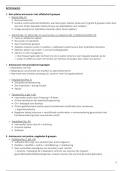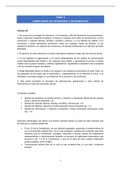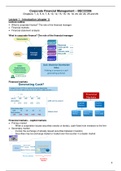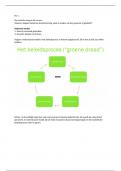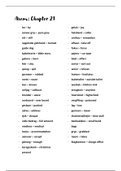Conservatism 9 Markers
Explain and analyse three ways in which conservative thinkers justify
private property
Explain and analyse three debates around the nature of conservatism
Explain and analyse three ways in which conservatives view government
Explain and analyse three ways in which conservatives view the free
market
Explain and analyse three ways in which conservatives view the role of
the state
Explain and analyse three ways in which conservative thinkers justify
inequality
Explain and analyse three ways in which conservative thinkers have
viewed the economy
Point 1
Traditional conservative thinkers have viewed the economy as volatile and unpredictable if
left completely free- may require pragmatic moderation by the state and a sceptical view of
human nature within the economic realm- welfare necessary to bind organic society
Hobbes – accumulation of wealth is necessary but insufficient to develop modern economy;
it is also necessary for wealth to be converted into capital, a process that requires the
inclusion of human work
o Needs state intervention to sustain economic activity – ‘fruit thereof is uncertain’ –
no place for industry, agriculture, navigation, no commodious building, require
cooperation and long term investment which cannot be done without order and
strong small state to protect rights and property
o Hobbes’ held belief that ordered society is needed to lead a free life which can be
seen when he stated that “good order is the foundation of all good things”- state
necessary to enable economy to develop - brings order and authority to the people.
Oakeshott believed that state intervention was necessary in order to moderate the economy
and in order to establish welfare - influenced by Disraeli’s idea of the danger of “two
nations” in unregulated economy to maintain an organic society and prevent radical
revolutions
o Demonstrates the Traditional and One Nation Conservative view towards
pragmatism and ‘changing to conserve’ in order to maintain order and authority to
prevent revolutions similar to France and Russia
o Insisted that human nature meant that individuals are intellectually imperfect due to
their irrational nature which would create instability in a free market economy
because it cause a disproportionate divide between the “two nations… the rich and
the poor”.
Hobbes sustained the negative view that humans are individualistically driven by self-
interest and would therefore cripple the economy without order and regulation because the
divide between the rich and the poor would lead to a radical revolution.
Humans too irrational to regulate wealth and prevent revolution - self-reliant and seeking
Point 2
Conservative thinkers from new right may favour rolling back the frontiers of the state
o Privatisation, deregulation and marketization
, o State should intervene only to control public finances and currency and maintain
stability – economy contains internal mechanism to restore to full employment but
relies on govt. not intervening
Minimal state is utopian
Opposition to coercion not charity – would be wrong to forcefully create
equal society - Just society- ‘ a place where people are at liberty to join
together voluntarily to pursue and attempt to realise their own visions of
the good life in the ideal community but where no one can impose his own
utopian vision upon others’
o Nozick and Rand – such measures wouldn’t just promote freedom but lead to
the return of economic growth and a vibrant prosperous society
o Much tighter control of government spending
o End to the dependency culture arising from expensive welfare states
o Deregulation and privatisation of services carried out by government
o Neutering of obstructive bodies with statist ideas such as trade unions or
local council
o Nozick- ‘Growth of government was the gravest contemporary threat to
individual freedom – thought the growth of welfare states in western
Europe – dependency culture ‘
Point 3
• explanation and analysis of how conservative thinkers have viewed the economy (eg Burke’s social
contract, Nozick’s view that taxation is legalised theft, Rand’s support for laissez-faire capitalist ideas
as seen in Atlas Shrugged and/or The Fountainhead).
Rand – men have to reject the ‘morality of altruism’- don’t need a regulated economy –
rather a meritocracy where people are responsible for their own success and failure
o Moral for individuals to act in their own self interest – ‘standard of value of the
objectivist ethics ; the standard by which one judges what is good or evil- is man’s
life, or; that which is required for man’s survival qua man’ , ‘since reason is man’s
basic means of survival, that which is proper to the life of a rational being is the
good, that which negates, opposes or destroys it is the evil’
Rand’s idea on objectivism that humans are capable of rationally pursuing their self-interest
which shows that they are capable of serving in a free market economy- should succeed on
their own merit if they are able to do so.
o Preferred idea of voluntary taxation
o ‘free market represents the social application of an objective theory of values’
Nozick believed that individuals are rational and driven by the idea of self-ownership of their
abilities and labour which also means they should be allowed to manage an unregulated
economy.
Nozick - Tax for the most part is theft – individuals have self-ownership – sole authors of
their talents and abilities – should be left alone to realise them without intervention of
government
Burke
o Equality of outcome was a ‘monstrous fiction’
Explain and analyse three ways in which conservative thinkers justify
private property
Explain and analyse three debates around the nature of conservatism
Explain and analyse three ways in which conservatives view government
Explain and analyse three ways in which conservatives view the free
market
Explain and analyse three ways in which conservatives view the role of
the state
Explain and analyse three ways in which conservative thinkers justify
inequality
Explain and analyse three ways in which conservative thinkers have
viewed the economy
Point 1
Traditional conservative thinkers have viewed the economy as volatile and unpredictable if
left completely free- may require pragmatic moderation by the state and a sceptical view of
human nature within the economic realm- welfare necessary to bind organic society
Hobbes – accumulation of wealth is necessary but insufficient to develop modern economy;
it is also necessary for wealth to be converted into capital, a process that requires the
inclusion of human work
o Needs state intervention to sustain economic activity – ‘fruit thereof is uncertain’ –
no place for industry, agriculture, navigation, no commodious building, require
cooperation and long term investment which cannot be done without order and
strong small state to protect rights and property
o Hobbes’ held belief that ordered society is needed to lead a free life which can be
seen when he stated that “good order is the foundation of all good things”- state
necessary to enable economy to develop - brings order and authority to the people.
Oakeshott believed that state intervention was necessary in order to moderate the economy
and in order to establish welfare - influenced by Disraeli’s idea of the danger of “two
nations” in unregulated economy to maintain an organic society and prevent radical
revolutions
o Demonstrates the Traditional and One Nation Conservative view towards
pragmatism and ‘changing to conserve’ in order to maintain order and authority to
prevent revolutions similar to France and Russia
o Insisted that human nature meant that individuals are intellectually imperfect due to
their irrational nature which would create instability in a free market economy
because it cause a disproportionate divide between the “two nations… the rich and
the poor”.
Hobbes sustained the negative view that humans are individualistically driven by self-
interest and would therefore cripple the economy without order and regulation because the
divide between the rich and the poor would lead to a radical revolution.
Humans too irrational to regulate wealth and prevent revolution - self-reliant and seeking
Point 2
Conservative thinkers from new right may favour rolling back the frontiers of the state
o Privatisation, deregulation and marketization
, o State should intervene only to control public finances and currency and maintain
stability – economy contains internal mechanism to restore to full employment but
relies on govt. not intervening
Minimal state is utopian
Opposition to coercion not charity – would be wrong to forcefully create
equal society - Just society- ‘ a place where people are at liberty to join
together voluntarily to pursue and attempt to realise their own visions of
the good life in the ideal community but where no one can impose his own
utopian vision upon others’
o Nozick and Rand – such measures wouldn’t just promote freedom but lead to
the return of economic growth and a vibrant prosperous society
o Much tighter control of government spending
o End to the dependency culture arising from expensive welfare states
o Deregulation and privatisation of services carried out by government
o Neutering of obstructive bodies with statist ideas such as trade unions or
local council
o Nozick- ‘Growth of government was the gravest contemporary threat to
individual freedom – thought the growth of welfare states in western
Europe – dependency culture ‘
Point 3
• explanation and analysis of how conservative thinkers have viewed the economy (eg Burke’s social
contract, Nozick’s view that taxation is legalised theft, Rand’s support for laissez-faire capitalist ideas
as seen in Atlas Shrugged and/or The Fountainhead).
Rand – men have to reject the ‘morality of altruism’- don’t need a regulated economy –
rather a meritocracy where people are responsible for their own success and failure
o Moral for individuals to act in their own self interest – ‘standard of value of the
objectivist ethics ; the standard by which one judges what is good or evil- is man’s
life, or; that which is required for man’s survival qua man’ , ‘since reason is man’s
basic means of survival, that which is proper to the life of a rational being is the
good, that which negates, opposes or destroys it is the evil’
Rand’s idea on objectivism that humans are capable of rationally pursuing their self-interest
which shows that they are capable of serving in a free market economy- should succeed on
their own merit if they are able to do so.
o Preferred idea of voluntary taxation
o ‘free market represents the social application of an objective theory of values’
Nozick believed that individuals are rational and driven by the idea of self-ownership of their
abilities and labour which also means they should be allowed to manage an unregulated
economy.
Nozick - Tax for the most part is theft – individuals have self-ownership – sole authors of
their talents and abilities – should be left alone to realise them without intervention of
government
Burke
o Equality of outcome was a ‘monstrous fiction’


